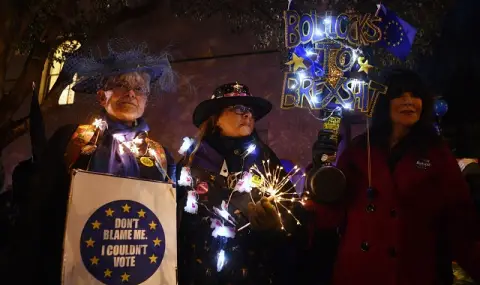The UK and the EU seem to be working to build the "closest possible relationship". What is behind this rapprochement between Brussels and London so soon after Brexit divided them?
For the first time since Brexit, the UK and the EU have taken a step closer to each other. British Prime Minister Keir Starmer visited Brussels for an informal EU defense summit. He was the only "foreign" guest at the meeting: despite the topic, there was not even a representative of Ukraine.
A new EU-UK summit has also been scheduled. It will be on May 19: this time Starmer will host EU leaders. It is not yet known whether this format will also include the heads of government of the EU member states. European Council President António Costa says he intends to dedicate the summit in May to building the "closest possible relationship".
What is the main motive for the rapprochement?
What lies behind the new rapprochement between the "divorced" Brussels and London? As the theme of the informal summit, to which the head of the British government was invited for the first time in five years, suggests, it is above all the need for cooperation in the field of defense against the background of the growing Russian threat and uncertainty in relations with the largest partner on the other side of the Atlantic.
"With President Trump coming to power, repairing our deteriorating relationship with Europe is more important than ever," said defense expert Helen Maguire. "We need to look for allies who are available", says Yannis Emanouilidis, research director at the Centre for European Policy in Brussels. It is clear that the UK is needed by the EU for its defence and security capabilities. This is probably what the EU will miss most after Brexit."
In what areas can we expect cooperation?
Starmer himself was the first to highlight the areas where he sees opportunities for cooperation: "Firstly, Ukraine has shown the importance of advanced technologies on the battlefield, so it is vital that we focus more on research and new developments. The UK has unique expertise in this area. Secondly, we need to improve military mobility and logistics across Europe so that we can more easily move troops and materiel to where they are needed. Third, we need to deepen cooperation to protect against state threats and sabotage, including with regard to underwater infrastructure."
He also proposed exploring the possibility of closer cooperation in conducting joint missions, where the joint training program for the Ukrainian military is already a positive example, as well as deepening industrial cooperation. "We will be more successful in building a European defense sector and we will contribute more to our own defense if we work together," the British Prime Minister said. "Fragmentation will weaken us all."
Not only military cooperation
The interest of both sides is there, but is it possible to expand the scope of interaction? "Today we talked about defense and security, but the United Kingdom and the European Union want to do more together," António Costa told reporters after the informal summit. It is not yet clear what this means and what the next step will be, says Fabian Zuleg, director general of the European Policy Centre, but it is on this that links to other areas of cooperation depend.
"Given the extensive list of possible areas of cooperation, the defence talks could be a starting point", said Jonathan Fall, former director of the UK referendum strategic issues working group.
Following the historic summit in Brussels, UK EU relations minister Nick Thomas-Symonds wrote an article in The Telegraph in which he explained that Brexit was certainly not cancelled, but that restoring relations with the EU meant that "the UK would be safer, more secure and more prosperous". According to London, although the EU is its largest trading partner (with trade expected to reach almost one trillion euros in 2023), it has declined, with exports to the EU set to fall by 27% and imports by 32% between 2021 and 2023.
According to Thomas-Symonds, since Brexit, Britain's borders have become less secure, the asylum system is in crisis, and spending in the last financial year has increased by one billion pounds compared to the previous year. "To raise living standards, we need to increase export and investment opportunities by reducing trade barriers. This is mutually beneficial: both the head of the European Commission and the president of the European Council emphasize the need for cooperation to promote innovation, accelerate economic growth and reduce costs for consumers," he concluded.
Few specifics and not much trust?
At the meeting in May, the UK and the EU will certainly make a joint statement on cooperation - at least in the field of security - or even sign some kind of agreement, experts predict. But for now, many questions remain.
"Does this mean that the UK will really return to European mechanisms? What does this mean for military procurement, for support for Ukraine? That is not clear at the moment,” said Fabian Zuleg of the Brussels-based Center for European Policy. In addition to the lack of specificity in the current statements, rapprochement could also be hindered by problems of trust between the partners, the expert believes. "One of the main issues that has been on the agenda almost from the very beginning of the Brexit process is trust", Zuleg notes.
However, a Politico poll of officials and diplomats found that they still believe that improving relations between the EU and the UK is possible, but no one expects a breakthrough in the short term. It will take time.
